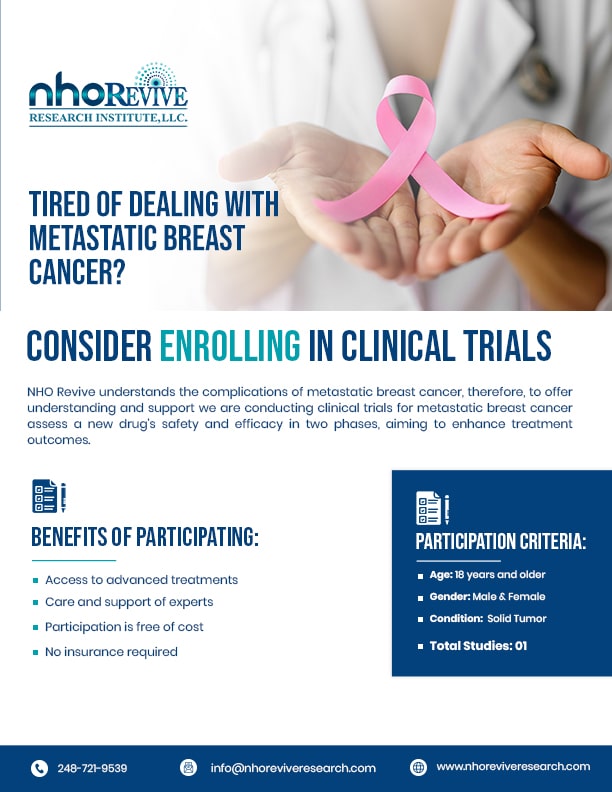Metastatic Breast Cancer Clinical Trials aim to improve living outcomes of individuals battling against this disease.
Metastatic Breast Cancer Clinical Trials in Nebraska
Push Metastatic Breast Cancer to the Curb
Potential Treatments for Metastatic Breast Cancer Trials
Metastatic breast cancer is often referred to as stage IV breast cancer, poses a significant oncological challenge, with a 5-year relative survival rate of approximately 27%. This aggressive form of breast cancer can spread to distant organs, making treatment a complex and challenging journey for those affected.
It’s important to recognize that survival rates can vary widely depending on factors such as the type of metastases and how well treatments work. Contrastingly, when breast cancer is caught early, before it has a chance to spread beyond the breast and nearby lymph nodes, the 5-year relative survival rate jumps significantly, often exceeding 90%.
NHO Revive recognizes the challenges posed by metastatic breast cancer and is actively conducting a breast cancer research study to explore potential therapeutic options. Our goal is to offer you exceptional care and unwavering support throughout your journey in our clinical trials.
You might be eligible for metastatic breast cancer trials
- Age:18 Years and older
- Gender: All
- Life expectancy of at least 3 months.
- Total Studies: 01
*Participation in our clinical study is voluntary, and it’s important to consult with your healthcare provider before making any decisions related to your treatment or care.
* Participation in the clinical trials causes no expenses for you or your private medical insurance. You’ll receive compensation for your time and travel.
Understanding Metastatic Breast Cancer
Metastatic breast cancer is an advanced and challenging stage where cancer spreads beyond the breast and nearby lymph nodes. This journey can be incredibly tough for patients, both physically and emotionally. At NHO Revive, we understand the gravity of this situation and the impact it has on individuals and their loved ones.
Our Metastatic Breast Cancer Clinical Trials is dedicated to evaluating the safety and effectiveness of an innovative drug designed for metastatic breast cancer. The clinical research study comprises two parts. This dual-phase approach is aimed at optimizing treatment outcomes for our patients.
What to Expect
If you volunteer for NHO Revive Metastatic Breast Cancer Clinical Trials by completing the form above, our study team will reach out to assess your eligibility. They’ll review the study specifics with you to check if you meet the criteria for participation.
If you qualify, you’ll be invited to the study site for screening, located within a 50-mile radius of where you are now. The doctors will discuss the trial’s duration and its impact on your cancer treatment. Once everything is explained, participants will be asked to sign an informed consent form. Make sure to go through everything with your provider. We value transparency between our participants and investigators
*You’ll receive study-related care at no cost, including comprehensive physical exams and evaluations conducted by skilled physicians.
Age
18 Year and Older
Gender
Male and Female
Location
Nebraska

300
Identifying Risk Factors
Risk factors for advanced metastatic breast cancer include a history of previous breast cancer diagnoses, certain genetic mutations (such as BRCA1 and BRCA2), hormone receptor status, HER2 status, age at diagnosis, family history of breast cancer, dense breast tissue, exposure to radiation therapy, obesity, alcohol consumption, and lack of physical activity. Understanding these risk factors is crucial for early detection and helping you prevent recurrence after metastatic breast cancer clinical trials.
Frequently Asked Questions
Interested in learning more about our research? Explore our frequently asked questions to gain knowledge about this condition.
What is the Potential Treatment for Metastatic Breast Cancer?
Treatment options for metastatic breast cancer may include chemotherapy, targeted therapy, hormone therapy, immunotherapy, and supportive care to manage symptoms and improve quality of life.
How does metastatic breast cancer differ from early-stage breast cancer?
Metastatic breast cancer has spread beyond the breast and nearby lymph nodes to other organs or tissues, making it more challenging to treat. Early-stage breast cancer is confined to the breast and has not spread to distant sites.
Why are Metastatic Breast Cancer Clinical Trials important for cancer research?
They are essential for advancing cancer research, testing the safety and effectiveness of innovative treatments, and improving outcomes for patients with metastatic breast cancer and other types of cancer.
Who can participate in a Metastatic Breast Cancer Clinical Trials in Nebraska?
The eligibility criteria for clinical trials vary depending on the study’s objectives, but typically include factors such as age, gender, medical history, and specific health conditions. You will be informed about the criteria when you fill in the form.





